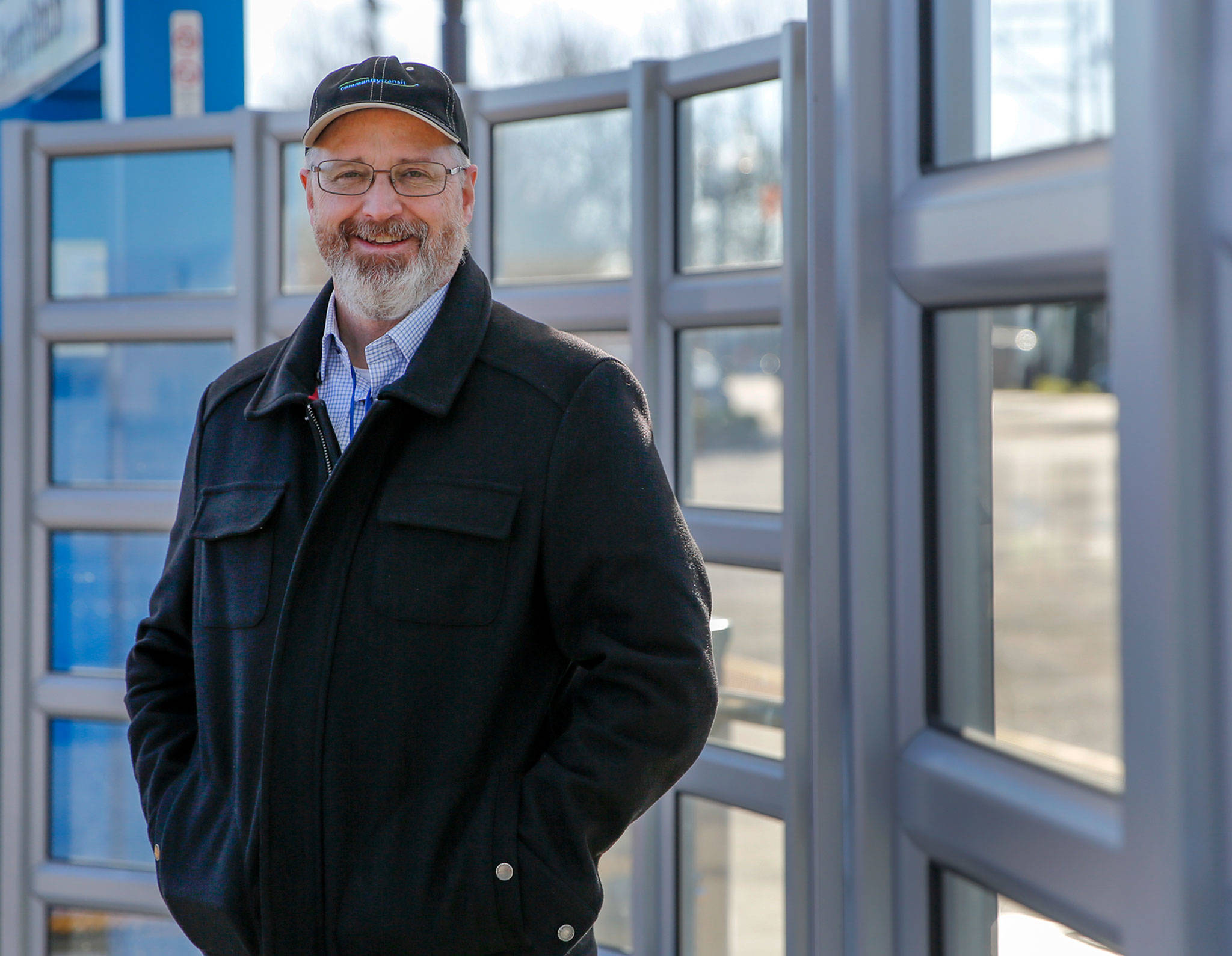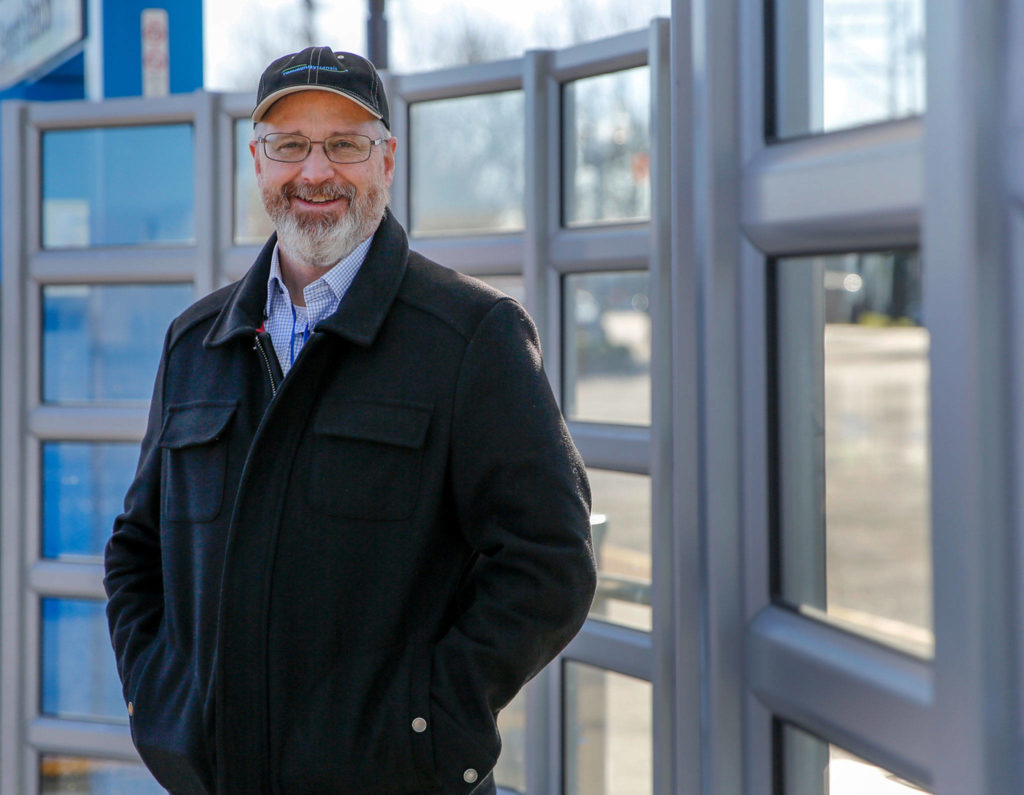Bus route and service expansion, labor negotiations and responding to changing rider habits — all while enduring the COVID-19 pandemic — are a few of the major items on the to-do list for new Community Transit CEO Ric Ilgenfritz.
In his first 10 days, Ilgenfritz has learned more about the agency’s status and outlook while getting to know some of the roughly 800 employees under his charge.
“All of those changes require intentional leadership and management to manage effectively,” he said. “COVID is the pressing issue of our time, and that’s where I want people to be focusing.”
Convincing people that public transit is safe is a top post-vaccine priority for Ilgenfritz and the agency’s leadership.
Ridership dramatically decreased across Community Transit’s bus and vanpool services during the pandemic’s early months, and any rebound will be gradual. This year’s collected fares are projected to be $10 million less than in 2019.
“We don’t know how quickly that comes back, even with vaccinations,” Community Transit Board Chairman and Marysville Mayor Jon Nehring said. “We just don’t know what type of riders we’ll get back.”
Ilgenfritz, 56, started Jan. 11, taking over from Emmett Heath, who retired. Ilgenfritz will earn $235,422 — the same as the previous CEO.
The salary and benefits were reasonable given Ilgenfritz’s experience and compared with similar-sized transit agencies’ CEO contracts, Nehring said. Recently retired Pierce Transit CEO Sue Drier earned a salary of over $219,000; King County Metro’s former general manager made over $305,000 in 2019; and Sound Transit CEO Peter Rogoff made about $385,000 last year.
Ilgenfritz left Portland, Oregon-based engineering consultancy David Evans and Associates, where he had been a regional vice president since 2017. He worked out of the company’s Seattle office and, during the pandemic, from his north Seattle home. His portfolio included transit and transportation projects with Sound Transit and the Washington State Department of Transportation.
“It’s tangible, the ability to deliver a transportation improvement, whether it’s a bus service or a train service,” Ilgenfritz said. “I believe in the power of public transit to improve people’s lives. The most valuable thing in everyone’s lives is time. We don’t have enough of it.”
Much of his professional career has been in government, first in the office of longtime former U.S. Rep. Al Swift, D-Bellingham, then on Sen. Patty Murray’s staff until 1999.
After a couple of years with the National Oceanic and Atmospheric Administration, Ilgenfritz joined Sound Transit, where he spent 16 years, including several on the executive leadership team. At the transit agency, which spans parts of King, Pierce and Snohomish counties, he helped lead planning for the ST2 and ST3 ballot measures to expand the bus and light rail systems, including the Lynnwood and Everett Link extensions.
“I went to Sound Transit because I saw something important there that was at risk,” he said, referring to withdrawn federal funds for some of the earliest projects. “I believed the Puget Sound region needed a mass transit system.”
The effect of light rail on Snohomish County transit riders will be of intense interest to Ilgenfritz and the organization. Northgate’s Link light rail station is to come online later this year. Once it does, Community Transit will divert a bulk of its Seattle commuter routes to the light rail station, where people can transfer to reach destinations farther south.
“We’re running more than 30% of our service into Seattle, into UW and into downtown,” Ilgenfritz said. “That’s really going to give us an opportunity to beta test the rail and bus integration.”
Beyond that, the Lynnwood Link extension’s four stations in Shoreline, Mountlake Terrace and Lynnwood are to open in 2024, which could further shift Community Transit’s north-south service.
The start of light rail service in Snohomish County doesn’t mean a draw-down for buses.
“The population of the region and the county will continue to grow,” Ilgenfritz said. “The economy of this region will continue to grow.”
Amalgamated Transit Union Local 1576, which represents drivers and other employees, agreed to a one-year contract extension that included a 3% cost of living raise. The contract is expected to be renegotiated later this year. But even before that, union leaders intend to ask for an extension of a 10% hazard-pay bump and for plastic barriers around drivers to separate them from passengers.
“We always try to prioritize the list” for negotiations, union president Kathleen Custer said. “We’re not seeking more than what the membership believes that they deserve.”
She said she hopes Ilgenfritz, with whom she had not yet spoken, will take “a more hands-on approach” with his employees “to understand the importance of labor in its rank-and-file and the work we do.”
One of his early priorities in the pandemic is employee safety, Ilgenfritz said. With the new Biden-Harris presidential administration and their plan for rapid and expansive vaccination, he’s hopeful transit employees can become eligible early.
“We’ll work actively with the state and with the county to try to get our folks taken care of as soon as possible,” he said.
Looking to the future, Ilgenfritz said, he’s read about the city of Everett’s consideration of a possible merger of its bus system with Community Transit. But he would let the city’s process conclude before weighing in. Community Transit’s tax rate is higher than what’s dedicated for Everett Transit, so it could end up costing people in Everett more to join.
“We’re going to defer to the city and follow the city’s lead on that,” he said. “If we’re asked to help, then we’re absolutely willing to do so.”
One of the differences between the two transit agencies is Everett’s investment in battery-powered electric buses, while Community Transit has stuck with diesel engines. Ilgenfritz wants to review the capital costs and technological progress for battery range and charging.
“We need to take a hard look at eventually switching to an electric component of the fleet,” he said.
Have a question? Call 425-339-3037 or email streetsmarts@heraldnet.com. Please include your first and last name and city of residence.
Talk to us
> Give us your news tips.
> Send us a letter to the editor.
> More Herald contact information.


























